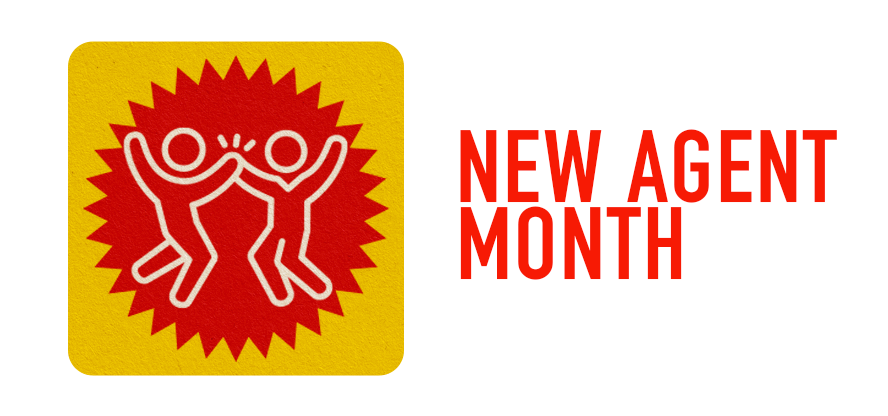 February is New Agent Month at Inman. Follow along as we go deeper on the tools, tech and tips you’ll need to survive and thrive in 2024. For curated content crafted just for first-year agents, be sure to subscribe to our weekly newsletter, The Basics.
February is New Agent Month at Inman. Follow along as we go deeper on the tools, tech and tips you’ll need to survive and thrive in 2024. For curated content crafted just for first-year agents, be sure to subscribe to our weekly newsletter, The Basics.
This post was updated Feb. 20, 2024.
Do you have a fear of public speaking?
It’s estimated that some 15 million people deal with glossophobia, or the fear of public speaking, daily, according to Orai.com. Some experts estimate that 77 percent of people experience it, according to Verywell Mind.
If you fall into that group, the good news is that public speaking is a learnable skill, one that you’ll use a lot in real estate. Whether onstage at a real estate conference, hosting a first-time buyer seminar, or simply leading a meeting with clients, speaking in front of people requires intense preparation, confidence-mustering and willingness to roll with the punches.
We thought it would be helpful to reach out to some of our seasoned speakers to find out their secrets for taming the butterflies and reaching the masses.
25 tips for public speaking in real estate
Take the leap
- Start small
- Practice taking honest feedback
- Once you’re comfortable, scale a little bigger
Do the prep
- Have your talking points ready
- Review them the night before
- Practice several times in advance
- Know your content without slides
- Don’t overwhelm yourself on the morning of
- Focus on the story, not the lines
- Make sure your first few sentences capture attention and imagination
- Have something meaningful to say
- Generate dozens of questions/talking points so there’s never a lull
Fight the butterflies
- Take a few deep breaths
- Focus on gratitude
- Remember your audience is rooting for you
- Pray, say a mantra, give yourself a pep talk
- Remember there’s no difference between 25 and 2,500
Be ready for flubs
- Be flexible
- Let the audience in on the mistakes
- Don’t take yourself too seriously
- Stay in control of the situation without stressing
- Learn how to redirect without getting thrown off
- If you get stuck, ask a question
- Be there for the audience, not for you
- Laugh

Wendy Forsythe | Photo credit: Fathom Realty
Wendy Forsythe, Fathom Realty
What’s the hardest thing about getting up in front of a crowd for you personally? How do you get past that?
The hardest part is doing the prep work in advance. Really taking the time to be thoughtful about the value you can bring to the audience you are addressing and then preparing to deliver that message is challenging.
It can bring up a lot of anxiety and worry about whether people really care about what you have to say and share. To get past this, I try to put myself in the shoes of the listener and reflect on the conversations I have each day with people to be sure I am prepared with key messages that I feel will most benefit the audience.
What does your pre-game look like?
I almost always have notes or slides I’ve prepared in advance. They are usually bullet points and key messages I want to convey. I will practice delivering my talk several times before actually delivering it. People have often complimented me by telling me how natural I look up on stage.
Believe me, the shy chubby kid is just under the surface. The only reason I look natural is because I am prepared. Depending on the type of presentation, I may even record myself. I want to think about the cadence of my speech, the tone of my voice, the rhythm of the presentation. These elements can take content to a whole new level and help you become a better speaker.
How do you prepare right before going onstage?
Right before I go onstage, I am full of energy and excitement. I really just try to contain that energy in a positive way so that it doesn’t turn into nervous energy. I do that by focusing on gratitude and taking some deep breaths. I have a personal mantra I often repeat to myself: Focus, Discipline, Commitment and Fun! When I hear my introduction, it is time to go have fun!
What’s your top tip for those who are trying to swallow the fear?
Preparation and practice is key. Don’t fly by the seat of your pants. Remember, the audience is rooting for you. They want you to shine.
Tell us about a time that things didn’t go so well on the stage.
Prior to going out onstage, we often get “mic’d up.” This consists of a portable microphone being clipped on your lapel that is attached to a small battery pack you clip onto your pants waistband.
I was leading a rather long session, and there was a break in the middle of it. I had to use the bathroom before we started and didn’t have time. So out I went onstage for Part 1. Everything went great. Break time came, and I really had to go to the bathroom. So I made a mad dash the second I got off stage.
Being in a hurry, I forgot about my microphone pack, and when I pulled my pants down in the bathroom the battery pack (still attached to the live microphone) fell into the toilet. I’ll spare you the rest of the details, but as you can imagine, there was a bit of a commotion in the bathroom stall as I fished the battery pack out of the toilet.
Then I had to go back up onstage, and I had no idea how much the audience had heard. Should I pretend nothing happened or try to explain what they likely heard broadcast through the speakers? I decided to share the whole story as we waited for the audiovisual team to get me a new microphone, since the swim in the toilet killed my battery pack. I blushed the entire time but the audience was great, we all had a good laugh, AV saved the day with a new microphone, and the show went on!
Stuff happens, you have to be flexible, and you have to not take yourself too seriously.

Barb Betts
Barbara Betts, The RECollective
What’s the hardest thing about public speaking, and how do you get past that?
Imposter syndrome! There are so many speakers in the real estate space, really good ones, ones I really admire. Getting over the fact that we are all different, that we all have a story to share, and that there is room for ALL of us was hard for me to get over.
I got past it by telling myself a new story. Telling myself that my message is important, that I am gifted and that there is room for me too!
What does your pre-game look like?
Always review content the night before, BUT NOT the morning of. If I review too much, I confuse and overwhelm myself.
How do you prepare right before going onstage (any rituals or tricks you’re willing to share)?
I love Mel Robbins 5, 4, 3, 2, 1 … I’m excited! I do get anxious; I used to call it nervous. And then I learned that I’m excited, not nervous, and I tell myself that moments before I go onstage. It changes my mindset and gets me excited for stage!
What’s your top tip for those who are trying to get out there?
Start at the local level. Start speaking at broker previews, local caravans or your local association. Start small, get comfortable! You will find your voice, find your niche, and find the right space and audience for you.
Tell us about a time that things didn’t go so well on the stage (names need not be included). What did you learn? How would you advise others not to sweat the small stuff?
The biggest challenge for a speaker can be when an event organizer wants you to take live questions from the audience. It’s something I think you should avoid if you can! And this is why … you can’t control the question that comes from the mic.
Sometimes they are negative, or not appropriate to ask. I’ve had it happen numerous times, and I’ve gotten good with giving the response of, “Great question, not really appropriate for our conversation today, how about I stay a few moments after and we can talk offline.” Having a candid response you can share with the audience ready to go is very important.
Technical difficulties can happen all the time. Best advice, ALWAYS know your content with or without your slides! If your slides disappear you can’t just stop talking!

Valerie Garcia
Valerie Garcia, consultant and speaker
What’s the hardest thing about getting up in front of a crowd for you personally? How do you get past that?
It’s not difficult anymore, but when I first started teaching and speaking, I was really young. I worried about being asked questions I didn’t know the answer to.
A wise mentor taught me to confidently say, “That’s a great question! I don’t know the answer. But I’ll find out and get back to you. Come see me after, and I’ll get your info so I can follow up.”
I learned that people don’t expect you to know everything, all they really want is to know that you care enough to help them, no matter what that looks like.
What does your pre-game look like?
Most people only see the 20-60 minutes you are on stage. They don’t see the dozens of hours you spent researching and building your talk. I don’t just write a keynote, I take the time to write a story with a beginning, middle and end.
When you are storytelling, and not just reciting words you’ve memorized, you are far more comfortable shifting for changes in timing and audience reaction. Take the time to craft a meaningful and impactful story. That’s my best pre-game advice.
How do you prepare for the stage?
Honestly, right before I go on stage, I always pray the same prayer: “Please give me the words that someone needs to hear.”
Then I fix the first thing I am going to say in my mind and start. I have found that if you know what you are going to say first, everything after that is easy.
Your first few sentences are critical — they either capture attention and imagination, or they give the audience an opportunity to get distracted by their phones.
Often speakers come on stage and waste that opportunity; they spend the first few minutes with lame jokes or lengthy introductions or the dreaded, “Good morning! I can’t hear you, let’s try that again! Good morning!”
Don’t waste your most critical moments — they set the tone for your entire talk.
What’s your top tip for those who are trying to swallow the fear and take the plunge into public speaking?
Someone once told me that no one wants to sit through a terrible talk. No one is hoping that a speaker will suck. The audience is on your side — they want you to succeed.
My best advice is to have something worth saying. Something that will be meaningful and helpful to an audience. Anyone can get onstage. The key is to have something to say once you get there.
Tell us about a time that things didn’t go so well on the stage.
Laugh.
Seriously, stuff will go sideways. Your slides won’t work, or the clicker won’t work, or you’ll flub up a word. Speaking is often a comedy of errors. But you are a human, talking to humans. The best way to handle it is to laugh. The audience will mirror you. If you laugh, they laugh. If you get tense and frustrated, they will feel that energy.
My favorite thing to say, when a joke doesn’t land and is met with silence, is “that one was for me.” Everyone laughs, and we move on. If you get stuck or lose your train of thought — take a question. Or pause and ask a question.
If you have something worth saying and you take the stage with the viewpoint that you are there for the audience and not for you, you’ll be great. I promise.

Joe Rand | Photo credit: BHGRE Rand Realty
Joe Rand, BHGRE Rand Realty
How do you get past getting onstage?
I’ve honestly never had a problem getting onstage in front of people. In fact, I’m actually more comfortable speaking to a group of 2,500 people than sitting down with someone one-on-one, where I get anxious. But I’m a freak.
What does your pre-game look like?
It’s boring advice, but the key to giving a good performance is preparation.
When I’m moderating a panel, I research all my panelists and come up with questions designed specifically for them. And I’ll generate a dozen possible questions for a 20-minute panel, even if I don’t expect to get to more than one or two because I never want to be unprepared for a lull in the conversation.
And if I’m doing a presentation myself, I’ll rehearse it over and over until I’ve gotten it to the point that I’m happy with it. I don’t understand people who try to “wing it.” You owe it to your audience to be prepared.
How do you prepare right before going onstage?
I just try to be relaxed. I watch the audience to get a sense of their mood. Are they a “hot” crowd — engaged, laughing, leaning in? Or are they “cold” — listless, disengaged, looking down at their phones? I want to know what I’m getting into.
What’s your top tip for those who are trying to tame the fear?
Work your way up. Do a presentation on something that you feel really confident in for a small group of people you know and trust will give you honest feedback. Get used to the feeling of speaking extemporaneously. Once you’re comfortable in that small group, scale up to bigger crowds.
Honestly, there’s no difference between speaking in front of a group of 25 and a group of 2,500. You do the exact same thing.
How would you advise others not to sweat the small stuff?
Remember, the audience is always rooting for you. They’re on your side. So if something happens — your slides don’t work, the mic goes out, whatever — don’t stress it. You’re not going to lose them over something like that. They want you to be good, too!
For example, I was once giving a short “top 10” talk with a colleague at Inman and didn’t realize she’d changed up the slide for “7″ until we were both on stage. Even worse, she’d written a bullet point I totally didn’t understand. And neither did she!
We literally stared at that bullet point on the screen for about 10 seconds rattling on incoherently until we both broke up and explained to the audience why we were confused. But it was fine. The audience laughed, and we just moved on.
What’s your top public speaking tip? Share in the comments section below.












